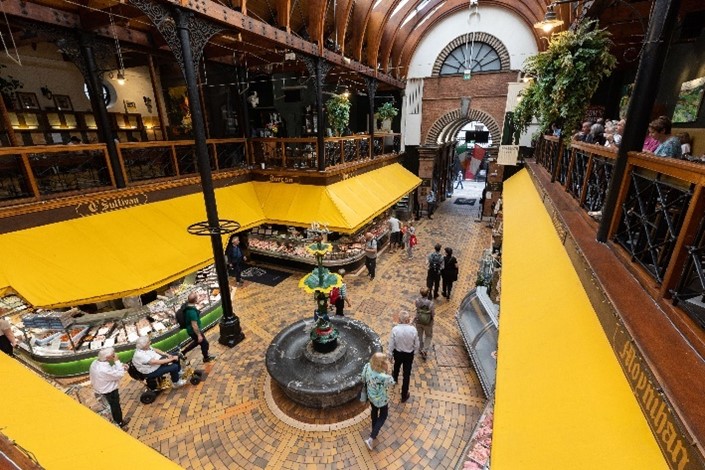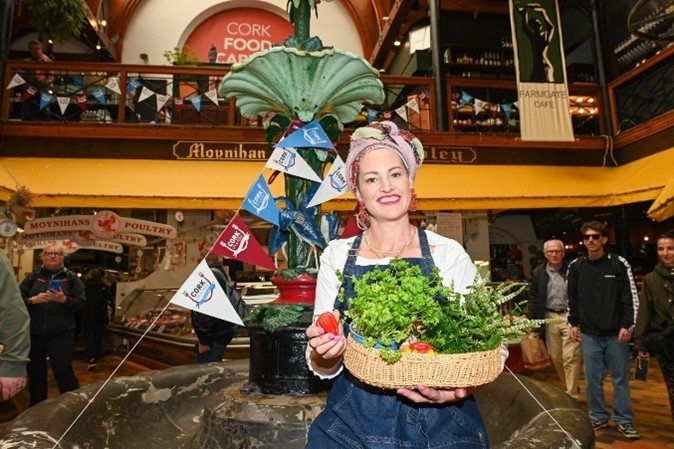Cork is widely known as a Maritime Haven, with its natural harbour being one of the largest in the world and the city motto on its coat of arms “Statio Bene Fide Carinis” meaning - “A Safe Harbour for Ships”. The people, culture and industry have all been influenced by the city’s deep history and continued connection to its Maritime heritage.
Cork Harbour and city have been a maritime gateway to Ireland since records began, with the region steeped in history. From monastic settlement in the 6th century, to Viking trading post, to the now busy port city in existence today it has a long-established city of merchants, trade and enterprise.

Trade, Industry and Education
From the 17th centuries area of trade from butter and provisions, the late 18th century new brewing and distilling commenced, and today technology, cybersecurity, dairy and pharmaceutical industries thrive. 194 multinational firms are present in Cork operating across sectors.
Cork City has become a top choice for investment due to a wealth of talent produced across a variety of disciplines by the city's two universities University College Cork (UCC) and Munster Technological University (MTU) and a highly innovative, supportive and collaborative business eco-system created by Cork City Council and other city stakeholders.

Cork City benefits greatly from its status as a hub for third level institutions and learning. Cork City is a university city with two higher education facilities: UCC and MTU (incorporating the Crawford College of Art & Design and Cork School of Music). Cork City is also home to three Further Education colleges and some leading-edge research institutes which have helped develop Cork City’s knowledge-based economy. MARei the Science Foundation of Ireland’s Research Centre for Energy, Climate and Marine research and innovation is located in the County, and the National Maritime College of Ireland are located just 20 minutes outside the city.
Cork City was voted the No.1 small European city for economic potential in the 2022/2023 edition of the Financial Times European Cities of the Future Awards

Things to do
As well as a hub of industry Cork has also a lively cultural centre for the arts, sports and recreational activities. There are numerous festivals and events taking place each year ranging from seasonal celebrations to form specific - music, literature, film and other artistic pursuits.
Cork’s friendly bars and hotels have a dynamic and year-round offering of activities while Cork City venues including Cork Opera House both present home-grown production and host touring artists throughout the year. With an abundant selection of indigenous and international cultural events there is plenty to keep you entertained.
The ample choice and immediate access to a range of outdoor spaces allows Cork to have a multitude of recreational activities on offer. From walks to marathons, exploring the coastline on dry land to water-based activities there is a choice and range of pursuits to suit any taste.
https://www.purecork.ie/ Discover Cork (corkcity.ie) Attractions - Cork City
History of Cork City
Cork is unique among other Irish cities in that it alone has experienced all phases of Irish urban development, from c.600AD to the present day. The settlement at Cork began as a monastic centre in the seventh century, founded by St Finbarre. Originally, Cork comprised a series of marshy islands, which the Irish for the city, Corcaigh, or marshes, reflects. Just west of the city centre the Lee splits into two channels, each flowing around the city before meeting again in Cork harbour. This means the city centre is an island, bounded by a north channel and a south channel. The urban centre was built on the lowest crossing-point of the river, where it meets the sea. This situation has given the city a rich maritime history and a strong identification as a port town.
Alongside the city’s physical development is the story of its people. In character they are astute, confident, and often rebellious – a trait passed down through generations and remembered in Cork songs and oral tradition. Corkonians make Cork unique. Many commentators have noted the sociable nature of the inhabitants, as Robert Gibbings, poet and writer, put it in 1944: ‘… people that you have never met in your life stop you in the street for a conversation’.
The city’s panoply of life – people, buildings, quays, bridges, river – echoes the history and cultural development of the acclaimed ‘southern capital of Ireland’. A walk-through Cork’s St Patrick’s Street, affectionately known as ‘Pana’, confirms the warmth of its people, the rich accent, the hustle and bustle of a great city and for me a city with a great heart. For more on the history of Cork City go to www.corkheritage.ie
There are many architectural remnants of the history of Cork throughout both the city and county, some of Cork’s many and impressive forts and castles can be viewed here
A Taste of Cork
Cork proudly considers itself the food capital of Ireland.
Cork’s cultural identity is defined by many magical things; within this mix of influences is the celebrated cuisine that touches every corner of city and county. There has always been a proud history and culture of food here. Age old traditions and new ways of thinking have shaped a way of life that centres around food and drink, which is reflective of the history of our people and the place of Cork.
We are blessed with lush countryside for dairy produce and livestock as well as a location that is rich in seafood. This paves the way for the wide array of fresh produce on offer from established and artisan food producers – readily available at farmer’s markets, in local supermarkets or on the menu at Cork’s ever flourishing eateries.
Cork has spearheaded the Irish food revolution and today it has an abundance of fantastic places to eat and drink, under the watchful eye of a cast of creative chefs. It’s a haven for artisan food producers and craft breweries, as well as being home to the established brands Murphys, Beamish and Jameson whiskey.
Cork is a destination that is actively leading the way in food festivals, gourmet trails or farmers’ markets as well as great dining experiences.
The Venue
City Hall is one of the most splendid buildings of Cork. The current structure replaced the old City Hall, which was destroyed in ‘The burning of Cork’, in 1920. It was designed by Architects Jones and Kelly and built by Cork Company Sisks. The foundation stone was laid by Éamonn de Valera, President of the Executive Council of the State on 9th July, 1932. The first meeting of the Council was held on the 24th of April,1935 and the building was formerly opened by Éamonn de Valera on the 8th of September, 1936.
The building is designed on classic lines to harmonise with the examples of eighteenth and nineteenth century architecture, fundamentally Georgian in character, that so richly endow Cork City.
Cork City Hall is located in the heart of the city.

Access - How to get to Cork
 By Air
By AirOur airport is located just 10 minutes from Cork City centre. Bus and taxi services are available just outside the arrivals area. Cork Airport offers direct flights from almost 50 destinations around Europe and a direct transatlantic flight to North America.
For a full list of inbound flights visit Cork Airport's website By Sea
By SeaLocated just 15km from Cork City centre, our ferry terminal offers easy access to and from mainland Europe. Brittany Ferries operate daily services between Cork-Roscoff (France) and Cork-Santander in (Spain).
Cork is also accessible via ferry from Rosslare and Dublin. Both ports offer daily services between Ireland-UK and are just a 3-hour drive away via car/bus. Operators at these ports include Irish Ferries, Stenaline and P&O Ferries
 Accommodation
AccommodationThere is wide range of accommodation choices for all budgets and tastes both in the City and in the surrounding areas. We have compiled a list of hotels with preferred rates which is available below.
Other information on accommodation in cork can be found at Where to Stay in Cork
 By Bus
By BusCork has a high quality (and affordable) bus network connecting the county with Dublin, Limerick, Galway and many more destinations. Buses usually operate from 6am until midnight.
Bus Éireann, the national public bus service, departs from Parnell Place Station as does Expressway while private operators like Citylink, Aircoach, K Coaches, Paddywagon, CobhConnect, CorkConnect, Cronins, BGM Coaches and Dublin Coach operators arrive/depart nearby (click here for map). By Train
By TrainCork's Kent Station offers easy access to the national rail network and is just a 10-minute walk from the City Centre.
From Kent Station you can also access local towns such as Cobh, Mallow, and Charleville. For more information visit the Irish Rail website.
 By Car
By CarCork is linked to Dublin via the M8 motorway and takes just over 2.5 hours. Car hire is available from depots in Cork City and all major airports.
Cork has an abundance of affordable on-street parking throughout the county. In Cork City, there are also numerous multi-story car parks with thousands of spaces available.



















